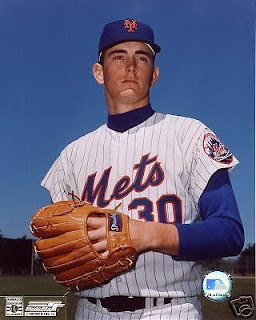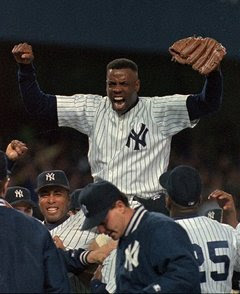Here is a Wall Street Journal article (from last season) by Carl Bialik (the first person references are his not mine) explaining the phenomenon:
In 1962, the New York Mets and the Houston Colt .45s (now the Astros) entered the National League. Seven years later, the San Diego Padres joined the NL, along with the Montreal Expos (now the Washington Nationals), while the AL added the Kansas City Royals and Seattle Pilots (now the Milwaukee Brewers). Since then, six more teams have joined the majors, most recently Arizona and Tampa Bay. After Matt Garza threw a no-hitter for the Tampa Bay Rays last season, every current major-league team has at least one no-hitter — except the Padres and Mets, beaten to the feat by at least six teams younger than them.
The Mets’ futility has been oft-lamented by their fans, and even has inspired a website (nonohitters.com which exists only to chronicle the hit that breaks up the Mets pitcher's no-hitter each night) all about the drought. (A drought which this Mets fan prefers to, say, a title drought such as the one experienced by fans of that other member of the class of ‘62, the Astros.) Padres’ pitchers inability to go a full game without yielding a hit also is surprising, since the team’s strength often has been its pitching.

Just how unlucky have the Mets and Padres been? To answer the question, I developed a simplistic statistical framework to estimate the probability that a team would get a no-hitter in any particular game. For any given team, I compiled for each season of its history the number of games it played, the number of innings pitched (IP) and hits allowed. There are three outs in an inning, so the probability, on average, that any one batter makes an out is roughly equal to three times IP divided by three times IP plus hits allowed (events other than outs or hits are disregarded because they neither break up a no-hitter nor otherwise affect its probability — at least not in an obvious way). A no-hitter over nine innings requires 27 straight outs without a hit, so its probability is the probability that any one hitter makes an out, raised to the 27th power.
Then the probability that a team doesn’t get a no-hitter in a given season is one minus the probability in any single game, raised to the power of the number of games in that season. And the probability that it never has a no-hitter is the product of each of those probabilities of no no-hitters in each season.
This is, again, simplistic. The biggest problem is that the probability that a given batter makes an out will vary from game to game, and within games. This could mean that the statistical approach outlined above underestimates the probability of a no-hitter, because it fails to account for a hot pitcher meeting a cold team in propitious stadium and weather conditions. Also it fails to account for postseason no-hitters (though there’s been only two in major-league history: Don Larsen’s perfect game in the 1956 World Series and Roy Halladay's no-hitter last season).

But it does surprisingly well despite such caveats. Applied to the New York Yankees, it predicts 9.76 regular-season no-hitters over their 110-year history. The Yankees have had 10 no-hitters in the regular season. Also, I applied it even more simplistically to major-league baseball as a whole, using just three numbers: The number of games, innings pitched and hits allowed in history. That yielded an expected total of 161 no-hitters. In reality, there have been 237, counting Larsen’s and Halladay's — so not far off.
So, back to the original question: How unlucky have the Mets and Padres been? There’s just a 3.9% probability that San Diego wouldn’t have gotten a no-hitter in its 42-year history, based on its pitching staff’s stats. And the Mets have been even unluckier — the chance of no no-hitter in their 49 seasons is 0.93%.
In the Mets’ case, at least, it doesn’t appear to be for lack of good chances. The team has had 34 one-hitters in its history — compared to an expected total of 41, using a similar approach to the one used to calculate expected no-hitters.
The bad news for the Mets is that their best chances may be behind them. The franchise’s best 14 seasons in terms of hits allowed per inning all were 20 or more years ago.

The above article is a great example of the strength and weakness of the modern age of statistical analysis. Everything that can't be measured is ascribed to luck. And in most cases when things that should happen don't, it is because of simple chance. But as the case with clutch hitting, human factors are often discounted. I don't think that's the case here, it's unlikely that say for instance a Mets pitcher carrying a no-hitter into the later innings would be more likely to get adversely affected by nerves because of his desire to break the team's string of no-hitterless years than a pitcher on another team that has had a no-hitter more recently.
But it does discount two important factors:
1) Papa Poop has called me during every near no-hitter in recent Mets history in an effort to prove that he is unable to jinx a no-hitter by calling me. So far he is failing.
2) The Mets are a jinxed, cursed organization. Though we do have two titles in 50 years (roughly in line with expected value were the conditions for success in major league baseball more even) Mets fans have also suffered through many heartbreaks, including the nightly one when the opposing team inevitably gets its first hit.
But someday that streak will end, I hope. And as Mets fans we still have hope, maybe that's all we have.
Nice post...Gee went 5 2/3 today before a hit to the pitcher, so we go one day wioth a no-no
ReplyDeleteone more day without
ReplyDeleteAfter 7,848 games I don't think you can blame this post for jinxing Gee today.
ReplyDeleteBut don't think I wasn't thinking that as I was watching.
In addition I was also thinking "could you imagine if the day I post this is the day the curse ends?"
That would have been ridiculous.
Amazingly, Papa Poop is at the game, and he did not call me.
I wasn't blaming you for jinxing Gee, i was complimenting the post as a fellow suffering mets fan...then just stating that it was getting close today
ReplyDelete